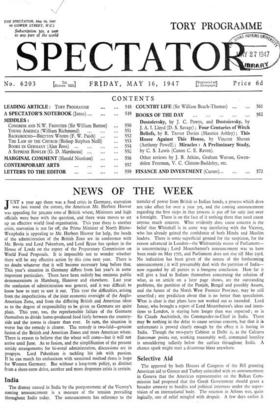NEWS OF THE WEEK
JUST a year ago there was a food crisis in Germany, starvation was just round the corner, the American Mr. Herbert Hoover was appealing for 300,000 tons of British wheat, Ministers and high officials were busy with the question, and there were moves to set up an effective world food organisation. This year there is another crisis, starvation is not far off, the Prime Minister of North Rhine- Westphalia is appealing to Mr. Herbert Hoover for help, the heads of the administration of the British Zone are in conference with Mr. Bevin and Lord Pakenham, and Lord Bruce has spoken in the House of Lords on the report of the Preparatory Commission on World Food Proposals. It is impossible not to wonder whether there will be any effective action by this time next year. There is no doubt whatever that it will become necessary long before that. This year's situation in Germany differs from last year's in some important particulars. There have been orderly but ominous public demonstrations in Hamburg, Hanover and elsewhere. Last year the confusion of administration was general, and it was difficult to know how to start to sort it out. This year the difficulties, arising from the imperfections of the joint economic oversight of the Anglo- American Zone, and from the differing British and American ideas as to the degree of responsibility to be given to Germans are quite plain. This year, too, the reprehensible failure of the Germans themselves to divide home-produced food fairly between the country- side and the towns is clearer than ever. In sum, the situation is worse but the remedy is clearer. The remedy is two-fold—genuine fusion of the British and American Zones and more American wheat. There is reason to believe that the wheat will come—but it will not arrive until June. As to fusion, and the simplification of the present untidy arrangements for bi-zonal administration, discussions are in progress. Lord Pakenham is tackling his job with passion. If he can match his enthusiasm with sustained method there is hope for Western Germany. But without a long-term policy, as distinct from a short-term drive, another and more desperate crisis is certain.


































